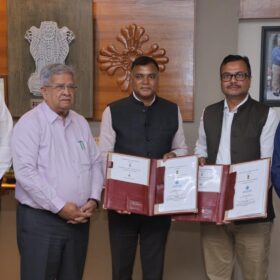Goa, India’s smallest state, has notified its Solar Energy Policy and set a target of 150 MW of PV capacity by 2022.
Under the policy, which will span the next seven years, the government will provide a 50% subsidy – including 30% from federal funds – for the capital cost of projects; a benchmark cost from the Ministry of New and Renewable Energy; or a figure arrived at through tendering by the Goa Energy Development Agency (GEDA).
According to the policy, solar power producers will have to participate in reverse bidding for installations classed in four capacity brackets: 100-1,000 kW; 1-5 MW; 5-10 MW; and 10 MW and larger. Projects in the first category will have to be completed within 240 days and any others will be given a year, with a 5% tariff penalty for late connections.
“The target is 150 MW by 2022 and so far GEDA has received more than 100 applications for solar projects,” GEDA member secretary Sanjeev Jogalekar told pv magazine. “To achieve the target, we are laying equal emphasis on rooftop and ground mounted projects.”
Subsidized energy hurts PV alternative
Commenting on the viability of solar projects in Goa, Jogalekar said PV is not economically viable at present because of a low energy tariff in the state.
“Though the electricity tariff is high, the consumers get it on subsidized rates,” he said. “As such, solar power generation becomes costly and the recovery period is more than seven years. However, as soon as the metering procedure is completed by the Department of Electricity, solar projects will pick up speed.”
Founded in 1996, GEDA is the state’s only implementing agency for non-conventional and renewable energy programs and is also the body to carry out centrally funded schemes in the field.
GEDA focuses on the promotion of solar thermal and PV systems and devices, solar rooftop installations – for net and gross metering – and rural energy activities such as the Integrated Rural Energy and Improved Chulhas programs.
The agency is promoting renewable energy by organizing awareness visits to schools, colleges, village panchayats and other groups.
This content is protected by copyright and may not be reused. If you want to cooperate with us and would like to reuse some of our content, please contact: editors@pv-magazine.com.








By submitting this form you agree to pv magazine using your data for the purposes of publishing your comment.
Your personal data will only be disclosed or otherwise transmitted to third parties for the purposes of spam filtering or if this is necessary for technical maintenance of the website. Any other transfer to third parties will not take place unless this is justified on the basis of applicable data protection regulations or if pv magazine is legally obliged to do so.
You may revoke this consent at any time with effect for the future, in which case your personal data will be deleted immediately. Otherwise, your data will be deleted if pv magazine has processed your request or the purpose of data storage is fulfilled.
Further information on data privacy can be found in our Data Protection Policy.